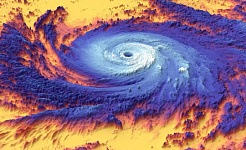
America's Crossroads: When Culture and Contamination Intersect
Indianapolis proudly claims Elvis’ last concert, Robert Kennedy’s speech in response to Martin Luther King Jr.’s assassination, and the Indianapolis 500.

How Israel's Water Strategy Could Save Arizona's Future
Arizona is one of the fastest-growing states in the U.S., with an economy that offers many opportunities for workers and businesses. But it faces a daunting challenge: a water crisis that could...

The Fourth Turning: A Crisis You Didn't Know We Needed
In their 1997 book, "The Fourth Turning: An American Prophecy," authors William Strauss and Neil Howe introduce the idea that historical events follow specific patterns called "saecula."

Sacred Fossils Are Becoming Rarer Because of Climate Change
Shaligrams, the sacred fossils that have been worshipped by Hindus and Buddhists for over 2,000 years, are becoming rarer because of climate change.

The Clock Is Ticking: Imagine A World With A Compelling Future
Amidst our busy lives filled with work deadlines, family gatherings, and the latest binge-worthy TV shows, an urgent whisper grows louder each day: the call to action on climate change.

The Illusion of Climate Havens: Why No U.S. City is Truly Safe
Looking for a US ‘climate haven’ away from heat and disaster risks? Good luck finding one

Cooling Climate Discourse: The Transformative Power of Language
The world is burning. Death Valley, Calif., shattered the record in July 2023 for the hottest temperature on earth

This Is the Climate Crisis: The Burning Reality of Maui
As Maui's fires raged on, fueled by a combination of drought, intense winds, and climate shifts, the reality of our times became inescapably clear: we are living the climate crisis.
LATEST VIDEOS
Can We Cool The Planet?
by
Climate change has emerged as one of the most pressing challenges of our time. Over the past century, human activities…
The Devastating Impact of 3C Global Warming
by
Global warming is a pressing issue that poses severe threats to our planet and all its inhabitants. In recent years,…
The Great Climate Migration Has Begun
by
The climate crisis is forcing thousands around the world to flee as their homes become increasingly uninhabitable.
The Last Ice Age Tells Us Why We Need To Care About A 2℃ Change In Temperature
by
The latest report from the Intergovernmental Panel on Climate Change (IPCC) states that without a substantial decrease…
The Caspian Sea Is Set To Fall By 9 Metres Or More This Century
by
Imagine you are on the coast, looking out to sea. In front of you lies 100 metres of barren sand that looks like a…
The Five Climate Disbeliefs: A Crash Course In Climate Misinformation
by
This video is a crash course in climate misinformation, summarizing the key arguments used to cast doubt on the reality…
The Arctic Hasn't Been This Warm For 3 Million Years and That Means Big Changes For The Planet
by
Every year, sea ice cover in the Arctic Ocean shrinks to a low point in mid-September. This year it measures just 1.44…
What Is A Hurricane Storm Surge and Why Is It So Dangerous?
by
As Hurricane Sally headed for the northern Gulf Coast on Tuesday, September 15, 2020, forecasters warned of a…





























